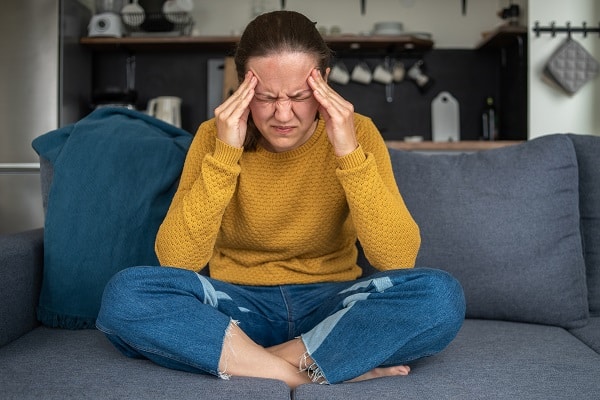You know your body better than anyone else. If you’re feeling off and can’t quite put your finger on it, there’s a good chance something is wrong. Many people ignore the early warning signs of illness, thinking they’ll go away. But often, these symptoms are your body’s way of telling you that you need to see a doctor. In this post, you will learn about some of the signs that indicate it’s time for a checkup. Don’t wait until it’s too late – if you’re experiencing any of these symptoms, please see a doctor immediately!
Contents
Losing Weight Randomly

When you suddenly start losing weight without making any changes to your diet or exercise routines, it’s a signal from your body that something could be wrong. This random and unexpected drop in weight should be taken seriously and evaluated as soon as possible because it could indicate a more serious underlying medical condition. Possible causes of unexplained weight loss include chronic diseases like diabetes, an overactive thyroid gland, depression, or even something as common as an infection.
Although many people fear the worst when they unexpectedly lose weight, early diagnosis is the first step towards treating any health issue sooner rather than later, so it’s important to take the signs your body is giving you seriously and get checked out by a doctor.
Shortness Of Breath

It’s normal to feel out of breath after a strenuous workout. But if you’re consistently short of breath, even when you’re not exerting yourself, it could signify a more severe condition. While some may try to just ignore it, it is best to see a doctor if you’re experiencing this symptom. Many potential causes of shortness of breath include heart disease, lung disease, and anemia. By getting a checkup, you can rule out or receive treatment for these and other possible conditions.
It is also good to keep in mind that shortness of breath may be from a psychological condition such as anxiety or depression. If this is the case, your doctor can refer you to a mental health professional for treatment. Don’t ignore shortness of breath just because you think it’s not a big deal. It could signify a severe health problem, so be sure to see your doctor if you’re experiencing this symptom regularly.
Abdominal Or Pelvic Pain

Abdominal or pelvic pain is another one of your body’s ways of communicating a problem. It could be indicative of something relatively benign like gas or indigestion, but it can also point to a more severe health issue such as an infection, appendicitis, ovarian cysts, or even cancer. If you’ve been experiencing abdominal or pelvic pain that lasts more than 48 hours and continues to interfere with your day-to-day activities, it’s always best to consult a physician.
Even if the cause isn’t determined at first glance, it could be worthwhile for your doctor to run the appropriate tests and make sure everything checks out okay or to see if further diagnostics may be needed. In any case, if you find yourself in pain in the abdominal or pelvic area, don’t delay, and make sure to get checked out as soon as possible.
Changes In Bowel Movements Or Urnination

Most people don’t give their bowel movements much thought – until something changes. A change in bowel movements or urination can signify a serious health problem, so it’s essential to see a doctor if you notice any changes. Blood in the stool, for example, can be a sign of colon cancer.
And a sudden change in the frequency or urgency of urination can be a sign of an infection or other issue with the urinary tract. Don’t wait to see if the problem goes away on its own – make an appointment with your doctor to find out what’s going on.
Persistent Headaches

Headaches can be caused by various things, from dehydration to stress. However, if you regularly experience headaches or migraines, it may be time to consult a doctor. Research has shown that headaches can be a symptom of underlying health conditions, such as sleep apnea or high blood pressure. Sometimes, headaches signify more severe problems, such as tumors or aneurysms.
If you’re concerned about your headaches, make an appointment with your doctor. They will be able to perform tests and determine whether or not there is a cause for concern. Don’t suffer in silence- find relief from your pain while also getting an understanding of the potential causes.
You Have A Lump Or Bump

Several types of lumps and bumps can occur on the body, and each one can indicate different things. For example, lipomas are typically benign (non-cancerous) growths of fat cells, while sebaceous cysts are small sacs that contain an oily substance called sebum. Cysts can sometimes become infected, so it’s essential to see a doctor if you notice one that is swollen, red, or painful.
Then there are fibroadenomas, which are growths that usually occur in young women. These are also usually benign, but they can sometimes become cancerous, so again, it’s essential to have them checked out by a doctor. Finally, there are pea-sized lymph nodes located throughout the body. These help fight infection and disease and can sometimes become enlarged. If you notice any of these different growths throughout your body it is best to err on the side of caution and get them looked at.
Chest Tightness

Chest tightness is often a feeling of heaviness or pressure in the chest. It may also feel like an invisible band is constricting your chest. Chest tightness is a common symptom of anxiety and panic attacks, but it can also signify a more severe condition, such as a heart attack. So if you are experiencing chest tightness, you must see a doctor as soon as possible to rule out any potentially life-threatening causes.
In most cases, chest tightness is harmless, and you can alleviate it with home remedies, such as deep breathing exercises or relaxation techniques. However, suppose chest tightness has other symptoms, such as shortness of breath, dizziness, or pain in the arm or jaw. In that case, it may be a sign of a more severe condition and should be evaluated by a doctor immediately.
Don’t Ignore These Warning Signs!
It is important to not only keep tabs on the overall health of your body but also listen to it and take the time to pay attention to what it is telling you. Seek out medical advice whenever something does not feel right, especially when you’re experiencing any of the symptoms above. When you make a conscious effort to monitor your health and listen to your body’s needs, you can easily be aware of potential concerns that arise. So remember, take the time to look out for yourself and be proactive about your own health!


